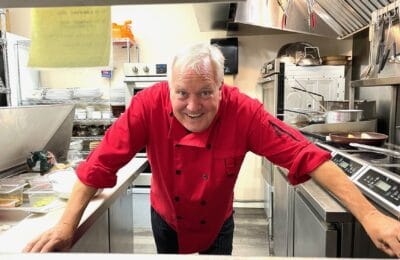“Skills can be taught. Character you either have or you don’t have.” Anthony Bourdain, Kitchen Confidential (2000)
Story by Janine Kennedy
Vacay.ca Writer
News broke out early on Friday of the untimely passing of chef, author and broadcaster Anthony Bourdain, leaving the international food community in shock.
When Anthony Bourdain wrote Kitchen Confidential, he didn’t expect it to blow up in popularity the way it did. He was still working as the chef at (now-defunct) Brasserie Les Halles in New York and hadn’t yet seen much of the world he ended up sharing through his many mediums. He didn’t realize exactly how poetic he was; how he could make even the most menial kitchen task sound extraordinary through his innate ability for word-craft and his genuine love of food.
When I attended culinary school in the Noughties, you could tell who the real future chefs were in the class and who were just there because they didn’t know what else to study. The serious students had all read Kitchen Confidential – devoured it, even. We hung on every word, despite (and maybe, for some of us, because of) the oft disturbing imagery and lewd descriptions of life in a professional kitchen.
I doubt that it was the actual content of Kitchen Confidential that made me decide to go to culinary school. I had already graduated from university with a degree in politics. I had a genuine love for food and travel and spent the years following university in South Korea, where I worked as a teacher and travelled throughout Asia. I wasn’t sure if I should go back to study journalism or follow my passion and become a chef.
Bourdain’s prose pushed me to risk the latter. The chef lifestyle didn’t necessarily attract me, but his intellect did. I thought: if this man can be both chef and writer, so can I. His descriptive storytelling helped prepare me for the shock that is working in a professional kitchen for the first time; his theoretical and, really, spiritual approach to literature, food and travel made absolute sense to me.
Read again on Vacay.ca: Anthony Bourdain to ‘Devour!’ Wolfville by Janine Kennedy
Now that I’ve been in the industry for a number of years – and having since become a culinary instructor – I realize Bourdain represented much more than he or anyone could have ever anticipated. He brought a human face to an industry that was previously never spoken of; an industry where burn-out and mental illness are as rampant as broken glassware.
Bourdain was, perhaps unwittingly at the time, among the first to point out that our industry needed to change. We have come to a point where we’re finally figuring out that maybe it’s not about the regimented, work-til-you-drop, pain-is-gain methodology we’ve all been born into. Maybe there’s a different way – a better way; a more ethical way – to get the best from our chefs and our own culinary careers.
As we experience an international chef shortage, burn-out, addiction, inability to make a living wage (or even have a life outside of work) and mental illness are at the core of the problem – and all of these issues have been outlined in Bourdain’s works. He suffered his fair share; to a heart-breaking end. Did he understand the tremendous affect his work had on the industry? I hope so.
Change is happening, slowly but surely. I teach my culinary students as much about self-care, mindfulness and how to find a kitchen that fits their ethics as I do knife skills. The best chefs are becoming aware that they get the most from their talented cooks and a lower employment turnover when they incorporate a better work-life balance into their kitchens (with less screaming).

One of Bourdain’s most famous interviews on his CNN show “Parts Unknown” was with former United States President Barack Obama. (Photo courtesy of CNN)
I also teach my students about Anthony Bourdain – and always will. He was the first to expose us Westerners to foods we would normally gag at, and he did it with complete respect, appropriate cultural sensitivity and a quick wit I couldn’t get enough of.
Millennial chefs, like myself, have mimicked his travels, taking note of the restaurants he has visited in various parts of the world (my personal favourite was babi guling in Bali – roast pig basted in coconut milk) as we explored the world in his footsteps.

Chef Anthony Bourdain made an appearance at Devour! The Food Film Fest in Wolfville, Nova Scotia. (Photo Courtesy Devour!)
It breaks my heart that this man accomplished so much and perhaps still felt it didn’t matter. It hurts that he has had such a profound impact on so many chef’s lives and, yet, possibly found his own life worthless.
We may never know the exact cause or reason for his suffering; but we can send his family and friends our love and support. We can love and support one another. And, as chefs, we can (and should) take it a little bit easier on ourselves.
In Bourdain’s own words, “Your body is not a temple; it’s an amusement park. Enjoy the ride.”
Note: If you or someone you love is suffering from suicidal thoughts, please check out Crisis Services Canada for support.









